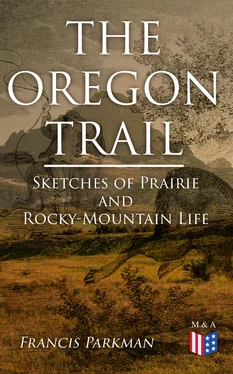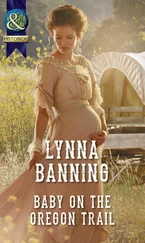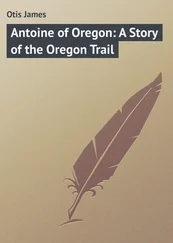Among various tales that circulated around our camp fire was a rather curious one, told by Boisverd, and not inappropriate here. Boisverd was trapping with several companions on the skirts of the Blackfoot country. The man on guard, well knowing that it behooved him to put forth his utmost precaution, kept aloof from the firelight, and sat watching intently on all sides. At length he was aware of a dark, crouching figure, stealing noiselessly into the circle of the light. He hastily cocked his rifle, but the sharp click of the lock caught the ear of Blackfoot, whose senses were all on the alert. Raising his arrow, already fitted to the string, he shot in the direction of the sound. So sure was his aim that he drove it through the throat of the unfortunate guard, and then, with a loud yell, bounded from the camp.
As I looked at the partner of my watch, puffing and blowing over his fire, it occurred to me that he might not prove the most efficient auxiliary in time of trouble.
“Delorier,” said I, “would you run away if the Pawnees should fire at us?”
“Ah! oui, oui, monsieur!” he replied very decisively.
I did not doubt the fact, but was a little surprised at the frankness of the confession.
At this instant a most whimsical variety of voices—barks, howls, yelps, and whines—all mingled as it were together, sounded from the prairie, not far off, as if a whole conclave of wolves of every age and sex were assembled there. Delorier looked up from his work with a laugh, and began to imitate this curious medley of sounds with a most ludicrous accuracy. At this they were repeated with redoubled emphasis, the musician being apparently indignant at the successful efforts of a rival. They all proceeded from the throat of one little wolf, not larger than a spaniel, seated by himself at some distance. He was of the species called the prairie wolf; a grim-visaged, but harmless little brute, whose worst propensity is creeping among horses and gnawing the ropes of raw hide by which they are picketed around the camp. But other beasts roam the prairies, far more formidable in aspect and in character. These are the large white and gray wolves, whose deep howl we heard at intervals from far and near.
At last I fell into a doze, and, awakening from it, found Delorier fast asleep. Scandalized by this breach of discipline, I was about to stimulate his vigilance by stirring him with the stock of my rifle; but compassion prevailing, I determined to let him sleep awhile, and then to arouse him, and administer a suitable reproof for such a forgetfulness of duty. Now and then I walked the rounds among the silent horses, to see that all was right. The night was chill, damp, and dark, the dank grass bending under the icy dewdrops. At the distance of a rod or two the tents were invisible, and nothing could be seen but the obscure figures of the horses, deeply breathing, and restlessly starting as they slept, or still slowly champing the grass. Far off, beyond the black outline of the prairie, there was a ruddy light, gradually increasing, like the glow of a conflagration; until at length the broad disk of the moon, blood-red, and vastly magnified by the vapors, rose slowly upon the darkness, flecked by one or two little clouds, and as the light poured over the gloomy plain, a fierce and stern howl, close at hand, seemed to greet it as an unwelcome intruder. There was something impressive and awful in the place and the hour; for I and the beasts were all that had consciousness for many a league around.
Some days elapsed, and brought us near the Platte. Two men on horseback approached us one morning, and we watched them with the curiosity and interest that, upon the solitude of the plains, such an encounter always excites. They were evidently whites, from their mode of riding, though, contrary to the usage of that region, neither of them carried a rifle.
“Fools!” remarked Henry Chatillon, “to ride that way on the prairie; Pawnee find them—then they catch it!”
Pawnee HAD found them, and they had come very near “catching it”; indeed, nothing saved them from trouble but the approach of our party. Shaw and I knew one of them; a man named Turner, whom we had seen at Westport. He and his companion belonged to an emigrant party encamped a few miles in advance, and had returned to look for some stray oxen, leaving their rifles, with characteristic rashness or ignorance behind them. Their neglect had nearly cost them dear; for just before we came up, half a dozen Indians approached, and seeing them apparently defenseless, one of the rascals seized the bridle of Turner’s fine horse, and ordered him to dismount. Turner was wholly unarmed; but the other jerked a little revolving pistol out of his pocket, at which the Pawnee recoiled; and just then some of our men appearing in the distance, the whole party whipped their rugged little horses, and made off. In no way daunted, Turner foolishly persisted in going forward.
Long after leaving him, and late this afternoon, in the midst of a gloomy and barren prairie, we came suddenly upon the great Pawnee trail, leading from their villages on the Platte to their war and hunting grounds to the southward. Here every summer pass the motley concourse; thousands of savages, men, women, and children, horses and mules, laden with their weapons and implements, and an innumerable multitude of unruly wolfish dogs, who have not acquired the civilized accomplishment of barking, but howl like their wild cousins of the prairie.
The permanent winter villages of the Pawnees stand on the lower Platte, but throughout the summer the greater part of the inhabitants are wandering over the plains, a treacherous cowardly banditti, who by a thousand acts of pillage and murder have deserved summary chastisement at the hands of government. Last year a Dakota warrior performed a signal exploit at one of these villages. He approached it alone in the middle of a dark night, and clambering up the outside of one of the lodges which are in the form of a half-sphere, he looked in at the round hole made at the top for the escape of smoke. The dusky light from the smoldering embers showed him the forms of the sleeping inmates; and dropping lightly through the opening, he unsheathed his knife, and stirring the fire coolly selected his victims. One by one he stabbed and scalped them, when a child suddenly awoke and screamed. He rushed from the lodge, yelled a Sioux war-cry, shouted his name in triumph and defiance, and in a moment had darted out upon the dark prairie, leaving the whole village behind him in a tumult, with the howling and baying of dogs, the screams of women and the yells of the enraged warriors.
Our friend Kearsley, as we learned on rejoining him, signalized himself by a less bloody achievement. He and his men were good woodsmen, and well skilled in the use of the rifle, but found themselves wholly out of their element on the prairie. None of them had ever seen a buffalo and they had very vague conceptions of his nature and appearance. On the day after they reached the Platte, looking toward a distant swell, they beheld a multitude of little black specks in motion upon its surface.
“Take your rifles, boys,” said Kearslcy, “and we’ll have fresh meat for supper.” This inducement was quite sufficient. The ten men left their wagons and set out in hot haste, some on horseback and some on foot, in pursuit of the supposed buffalo. Meanwhile a high grassy ridge shut the game from view; but mounting it after half an hour’s running and riding, they found themselves suddenly confronted by about thirty mounted Pawnees! The amazement and consternation were mutual. Having nothing but their bows and arrows, the Indians thought their hour was come, and the fate that they were no doubt conscious of richly deserving about to overtake them. So they began, one and all, to shout forth the most cordial salutations of friendship, running up with extreme earnestness to shake hands with the Missourians, who were as much rejoiced as they were to escape the expected conflict.
Читать дальше












